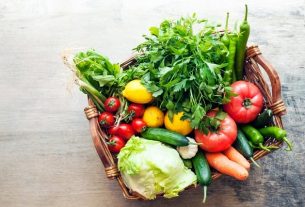The diet for Crohn’s disease is one of the most important steps in the treatment, as some foods can worsen symptoms and should therefore be avoided. For this reason, whenever possible, you should also prefer healthy and varied options to avoid nutritional deficiencies.
Generally, people with Crohn’s disease experience periods of intense gastrointestinal symptoms, such as diarrhea, vomiting, nausea, abdominal pain, changes in taste, constipation and loss of appetite, which can result in malnutrition. See how to identify Crohn’s syndrome.
Generally speaking, it is important that the diet for this disease is low in foods rich in sugar and caffeinated drinks because sugars and caffeine irritate the intestine and can increase the symptoms of Crohn’s disease.

What to eat for Crohn’s disease
Crohn’s disease is a health problem in which there is constant inflammation of the intestine, interfering with the absorption of nutrients. The degree of malabsorption depends on how much the intestine has been affected or whether part of it has already been removed due to the disease.
Therefore, the objective of nutrition in Crohn’s disease is to avoid intestinal irritation and malnutrition, promote, as far as possible, the absorption of nutrients, alleviate symptoms, avoid new crises and improve the person’s quality of life through a natural food.
1. Allowed foods
Some foods allowed in the diet are:
- Rice, purees, pasta and potatoes;
- Lean meats, such as chicken;
- Boiled egg;
- Fish such as sardines, tuna or salmon;
- Cooked vegetables, such as carrots, asparagus and pumpkin;
- Cooked and peeled fruits, such as bananas and apples;
- Dairy products, as long as the person is not lactose intolerant;
- Avocado and olive oil.
In addition to consuming these foods, it is recommended to take omega 3 supplementation to help reduce inflammation and, depending on the nutritional risk, some vitamins and minerals such as calcium, folic acid, vitamin B12, iron and vitamins A, D, E and K.
Furthermore, the use of probiotics and glutamine can also help improve bowel function, however, all of these supplements must be prescribed by a doctor or nutritionist.
Some people, in addition to Crohn’s disease, have lactose intolerance and/or gluten intolerance and, in these cases, these people should also avoid these foods and, if they do not have these intolerances, it is possible to consume pasta and skimmed dairy products in small portions.
2. Foods to avoid
Foods that should be avoided because they can irritate the gastrointestinal tract and worsen symptoms are:
- Coffee, black tea, caffeinated soft drinks;
- Seeds;
- Raw vegetables and unpeeled fruits;
- Papaya, orange and plum;
- Honey, sugar, sorbitol or mannitol;
- Dried fruits, such as peanuts, walnuts and almonds;
- Oat;
- Chocolate;
- Alcoholic beverages;
- Pork and other fatty meats;
- Buttery biscuits, pastries with puff pastry, chocolate;
- Fried foods, gratins, mayonnaise, processed frozen meals, butter and cream.
These foods are just a few examples that, in most people with Crohn’s disease, can worsen the symptoms of the disease, however foods can vary from one person to another.
Therefore, it is important to identify which foods are related to the worsening of symptoms and communicate them to the nutritionist, this way it is possible to avoid new crises and nutritional deficiencies, as the food responsible for the symptoms can be exchanged for another with the same nutritional properties.
Watch other eating tips to control symptoms in the video below:
Menu for Crohn’s disease
The following table indicates a 3-day menu for Crohn’s disease:
The diet for Crohn’s disease varies from person to person because sensitivity can increase at any time and even foods that were normally consumed may have to be eliminated from the diet for a period, so it is necessary to adapt the diet according to each person. patient and counseling with a nutritionist or nutritionist is essential.
Which specialist to consult
The most suitable specialist to guide the diet for Chron’s disease is a nutritionist, who can create an individualized meal plan for each person’s needs and tastes. However, the gastroenterologist can also give recommendations on what to eat and what to avoid.
Taking care of your health has never been easier!
Other important recommendations
People with Crohn’s disease should eat several small meals during the day, avoiding going for a long time without eating so that the intestine maintains regular activity. Furthermore, it is very important to chew your food well to help with the digestive process, reducing the chances of intestinal irritation.
Furthermore, it is important to chew your food well to help with the digestive process and, preferably, in a quiet environment. Foods that may aggravate symptoms should also be avoided, limiting the consumption of fiber and foods rich in fat.
To reduce the fiber content of fruits and vegetables, you can remove the skin, cook it and make it into a puree. Food must be cooked with natural seasonings and prepared grilled, boiled or in the oven.
Because Crohn’s disease can cause diarrhea, it is important to stay hydrated by drinking water, coconut water, and fruit juice diluted with water and strained to avoid dehydration.
It is important to consult a nutritionist regularly, as it may be necessary to make some dietary changes to avoid malnutrition and alleviate the symptoms of the disease.

Sign up for our newsletter and stay up to date with exclusive news
that can transform your routine!
Warning: Undefined array key "title" in /home/storelat/public_html/wp-content/plugins/link-whisper-premium/templates/frontend/related-posts.php on line 12
Warning: Undefined array key "title_tag" in /home/storelat/public_html/wp-content/plugins/link-whisper-premium/templates/frontend/related-posts.php on line 13




